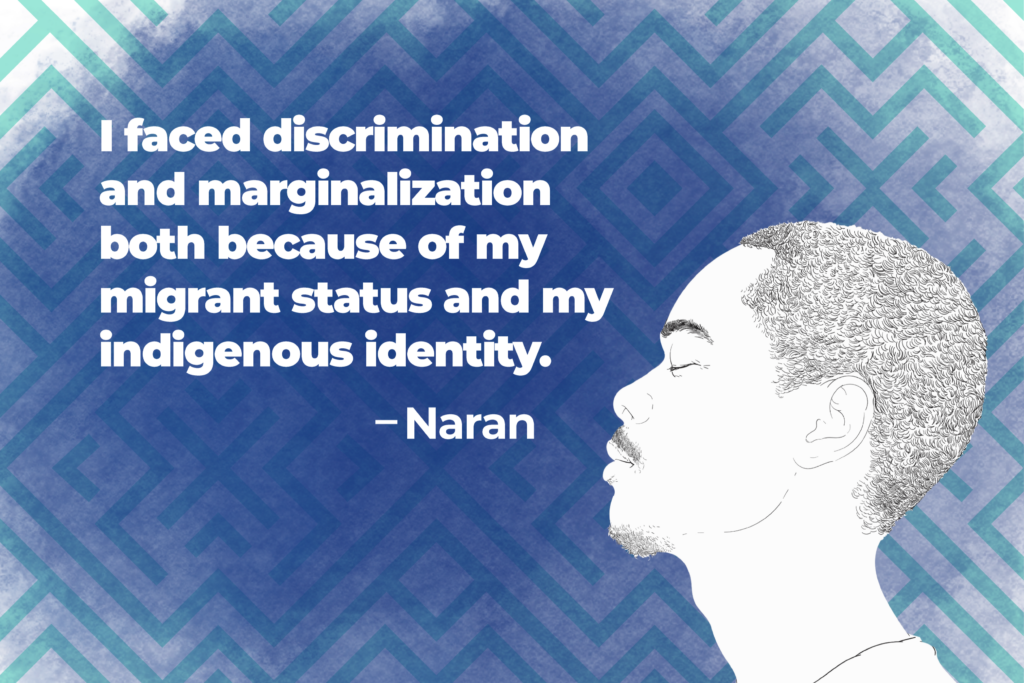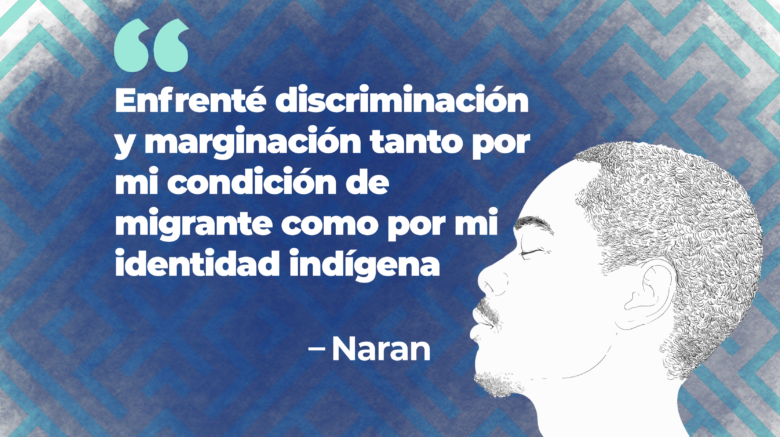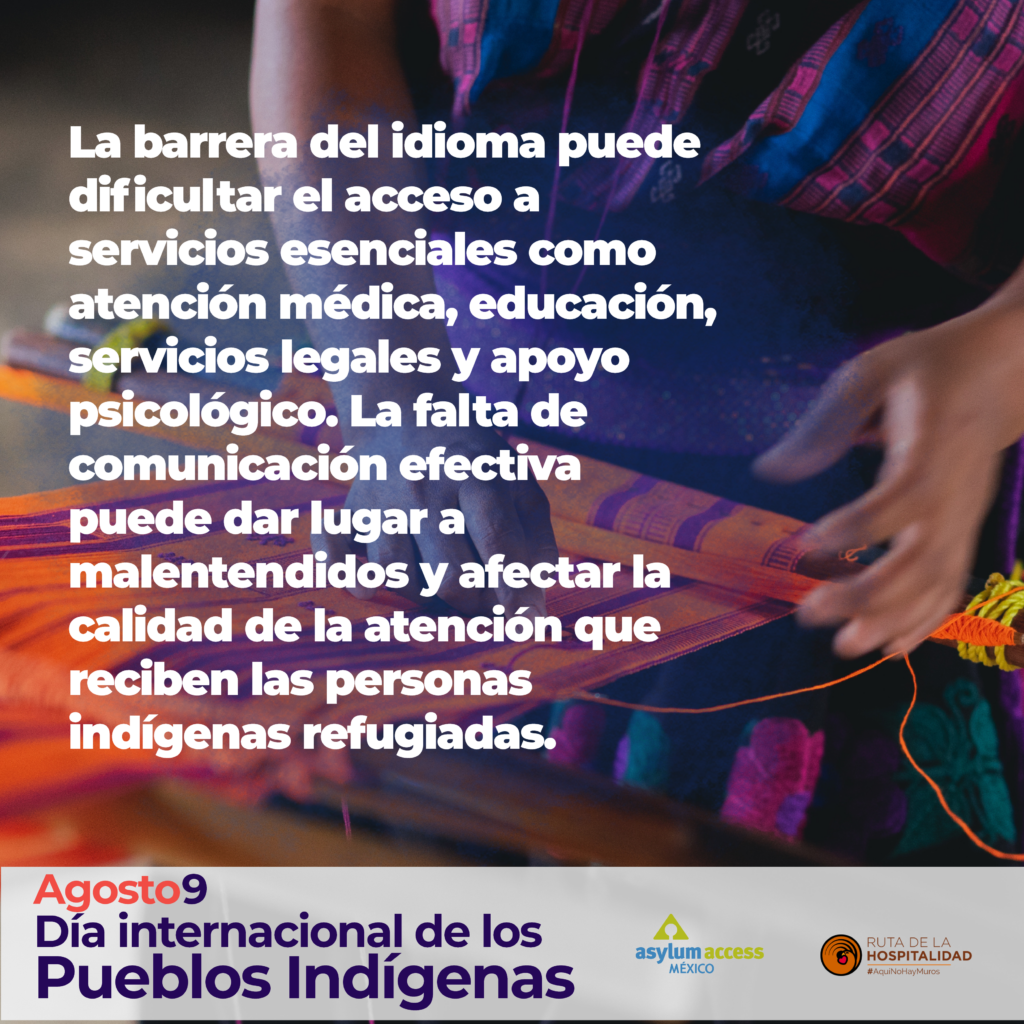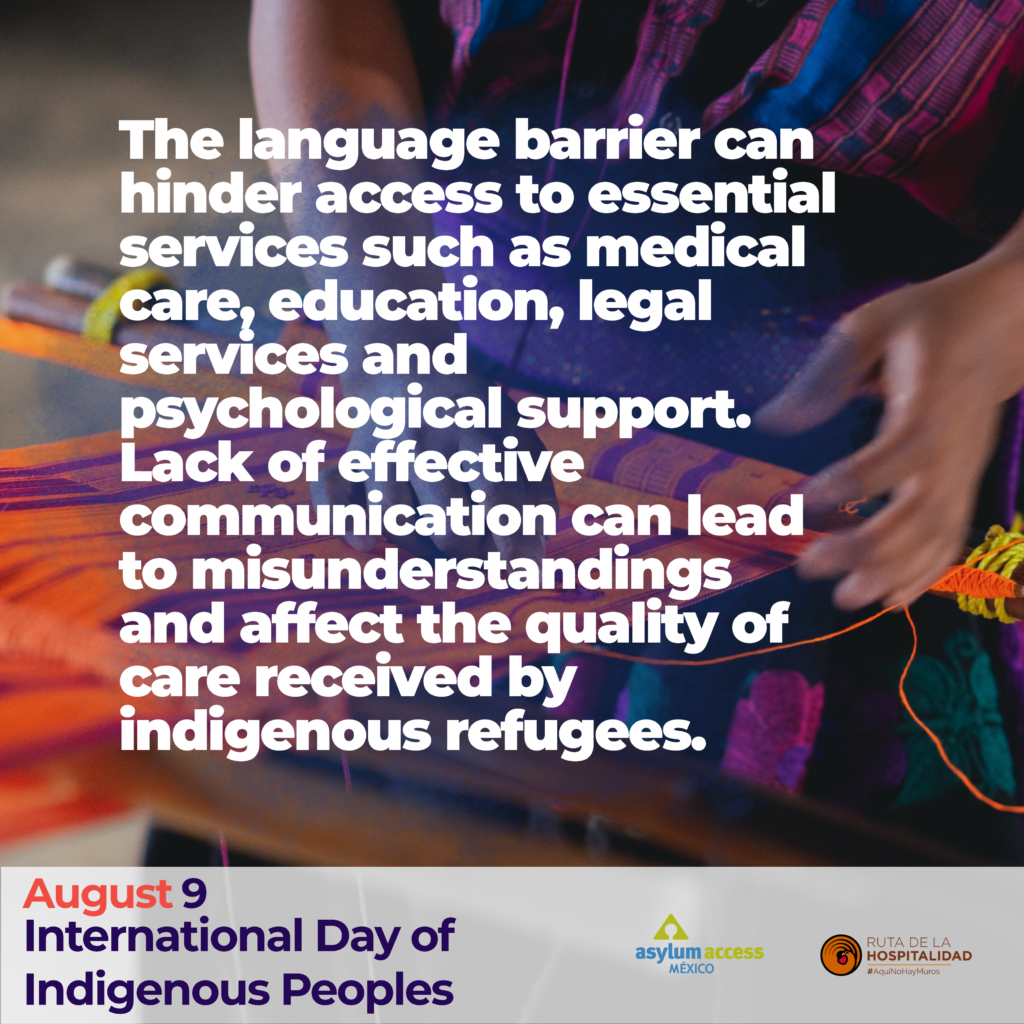English version below
Naran es un joven de 19 años perteneciente a la cultura Xinca de Guatemala, quien ha vivido pacíficamente entre sus tradiciones y el mundo contemporáneo. Sin embargo, gracias a la violencia creciente en contra de su pueblo y sus tradiciones Naran y su familia se vieron obligados a huir de su hogar.
Naran y su familia dejaron su pueblo sin posesiones o documentos personales y emprendieron su viaje a México. Aunque sabían que este sería un viaje peligroso, estaban decididos a encontrar un lugar en donde se sintieran a salvo.
Después de días de travesía, Naran y su familia llegaron a la frontera entre Guatemala y México, donde cruzaron junto con un grupo de personas migrantes mediante balsas. Al cruzar la frontera, Naran y su familia fueron secuestrados por un grupo de “coyotes” de la región y no fueron rescatados hasta 2 meses después, gracias a las autoridades locales. Otros migrantes rescatados señalaron a Naran como uno de los secuestradores y sin ninguna razón aparente, fue señalado como sospechoso. La policía, sin entender su idioma o su cultura, lo detuvo sin darle la oportunidad de explicarse.
A pesar de los esfuerzos de Naran por comunicarse y demostrar su inocencia, fue encarcelado injustamente. La barrera del idioma dificultaba aún más su situación, y no tenía a nadie que pudiera ayudarlo. A pesar de que no había pruebas sólidas en su contra, Naran seguía privado de su libertad gracias a una presunción infundada basada en el miedo y los prejuicios.
Naran luchó incansablemente pero la barrera del lenguaje complicó la situación, y el cuestionamiento de la validez del arresto y la falta de un debido proceso para Naran. Mientras tanto, en el pueblo de los Xinca, la tribu se enteró de la injusticia que estaba sufriendo Naran. Se organizaron para enviar mensajes de apoyo y oraciones, manteniendo la esperanza de que su espíritu resistente prevaleciera.
Finalmente, después de meses de intensas audiencias y batallas legales, la justicia prevaleció. Se logró demostrar la inocencia de Naran y, con la ayuda de su familia como testigos que respaldaron su historia, finalmente fue liberado.
Naran y su familia obtuvieron el estatus de refugiados y, a pesar de los momentos difíciles, la experiencia lo fortaleció y le enseñó la importancia de luchar por la justicia y la unidad.
Naran decidió que, a pesar de las adversidades, seguiría luchando por un futuro donde los indígenas migrantes fueran tratados con respeto y dignidad.
Las Organizaciones de la Sociedad Civil (OSCs), como Asylum Access México, desempeñan un papel crucial en la promoción de la sensibilización y el respeto hacia las personas indígenas desplazadas y han llevado a cabo programas de educación, sensibilización y acompañamiento para fomentar el entendimiento, tolerancia y el respeto a los derechos humanos de las comunidades indígenas y urbanas.
Historias como la de Naran se han convertido en un símbolo de esperanza y cambio, inspirando a muchos a no rendirse frente a la injusticia y a trabajar juntos y juntas para construir un mundo más inclusivo y compasivo para todas las personas.
La historia de Naran es una historia de vida basada en hechos reales

Silenced Voices: The Language Barriers Challenging Indigenous Forcibly Displaced People
Naran is a 19-year-old young man from the Xinca culture of Guatemala who has lived peacefully between his traditions and the contemporary world. However, due to increasing violence against his people and their traditions, Naran and his family were forced to flee their home.
Naran and his family left their village without possessions or personal documents and set out on their journey to Mexico. Although they knew this would be a dangerous journey, they were determined to find a place where they would feel safe.
After days of traveling, Naran and his family arrived at the border between Guatemala and Mexico, where they crossed with a group of other migrants on boats. Upon crossing the border, Naran and his family were kidnapped by a group of coyotes from the region and were not rescued until two months later by local authorities. Other rescued refugees named Naran as one of the kidnappers for no apparent reason. He was singled out as a suspect. The police, not understanding his language or culture, detained him without giving him a chance to explain himself.
Despite Naran’s efforts to communicate and prove his innocence, he was unjustly imprisoned. The language barrier made his situation even more difficult, and he had no one who could help him. There was no solid evidence against him, but Naran was still deprived of his freedom because of an unfounded presumption based on fear and prejudice.
Naran fought tirelessly, but the language barrier complicated the situation, as did the questioning of the validity of the arrest and the lack of due process for Naran. Meanwhile, in the Xinca village, the tribe learned of the injustice Naran was suffering. They mobilized to send messages of support and prayers, holding out hope that his resilient spirit would prevail.
Finally, after months of intense hearings and legal battles, justice prevailed. Naran’s innocence was proven, and with the help of his family as witnesses to back up his story, he was finally released.
Naran and his family were granted refugee status and, despite the difficult times, the experience strengthened him and taught him the importance of fighting for justice and unity.
Naran decided that, despite the adversities, he would continue to fight for a future where Indigenous refugees would be treated with respect and dignity.
Civil Society Organizations (CSOs), such as Asylum Access Mexico, play a crucial role in promoting awareness and respect for displaced indigenous people and have carried out education, awareness, and accompaniment programs to foster understanding, tolerance, and respect for the human rights of Indigenous and urban communities.
Stories like Naran’s have become a symbol of hope and change, inspiring many to stand up to injustice and to work together to build a more inclusive and compassionate world for all people.
Naran’s story is a life story based on true events.



